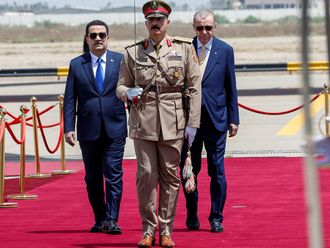Ramallah: A series of illnesses that sent Palestinian National Authority (PNA) president Mahmoud Abbas to the hospital has put the 83-year-old leader under renewed pressure to designate a successor, a decision he’s still resisting.
Abbas will outline his vision for contending with hostility from the Israeli regime, Hamas and the Trump administration at a meeting of the Palestine Liberation Organisation’s (PLO) Central Council in Ramallah, that starts on Wednesday. More relevant to the governing body’s 135 delegates may be how much longer he can sustain the rigours of office.
The two-day gathering this week is aimed at “trying to reinforce Abbas’s legitimacy, which is fumbling in a way that is apparent to all,” said Sam Bahour, a Ramallah business consultant and founder of Americans for a Vibrant Palestinian Economy.
Abbas’s rejection of US President Donald Trump’s peace plan even before its release sacrificed financial and political support that had buoyed the PNA since the Clinton administration. A potential vacuum at the top of the PNA has generated so much concern because of the prospect for chaos and violence.
From time to time, Abbas has raised the possibility of deliberately letting the PNA collapse, potentially forcing the Israeli regime to assume responsibilities it gave up 25 years ago with the Oslo peace process, ranging from providing electricity to postal service and sewage repair.
Man behind the leader
Abbas, known as Abu Mazen, was elected in 2005 for a five-year term, but after Hamas wrested control of Gaza in 2007, he stayed in power in the West Bank without holding another election. He has occasionally raised the topic of retirement, but has shown no indication of doing so.
Hamas has eclipsed the PNA on the world stage since Gazans started staging weekly protest marches against Israel in late March, and could seek to take over the West Bank as well. The leadership of Abbas’s Fatah party is so splintered that any succession battle is liable to turn bitter. “As long as Abbas is there, nobody in Fatah will dare press this issue openly,” said Khalil Shikaki, director of the Palestinian Centre for Policy and Survey Research in Ramallah. Once he’s gone, “there will be a very different environment.”
After Abbas, if the PNA follows constitutional protocol, his immediate successor pending elections would be the Hamas leader, Aziz Dweik, Palestinian Legislative Council speaker. Abbas will do whatever he can to avoid that scenario, Shikaki said.
Top contenders in elections could include Marwan Barghouti and Esmail Haniyeh.
Barghouti has been a consistent front-runner in Shikaki’s polls even though he’s serving five life terms in an Israeli prison, convicted of planning terrorist attacks. Haniyeh, polling second, would stir a hornet’s nest if he were to win a presidential election, facing vigorous opposition to his vision of Islamic government from secular Fatah leaders and much of the West.
Abbas addressed the succession issue obliquely in May speech to Fatah leaders, without indicating whom he favoured. “We do not want to keep the culture of the individual,” he said. “We want the culture of the institution.”
Uncertainty about succession plans could affect foreign direct investment in Palestine, said Bahour. FDI to Palestinian areas dropped 31 per cent in 2017 from the year before, to just over $200 million, according to the World Bank. “People are scared,” Bahour said. “They want to know who is going to be in charge.”











